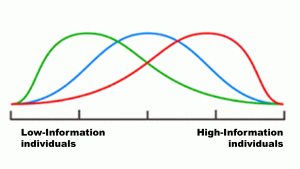
The title of this post was a question recently asked on Quora. It included a link to this video, which stated that successful products had to fulfill three criteria: awesome, cheap, and profitable. Hmm…
I’d like to take my answer in a different direction.
Strategic imperatives are the “big picture” aspirations or goals that guide product management. The extent to which products fulfill the aspirations, or fit the desired strategy, determines their success. Let’s consider a few examples.
Example One: Political Campaigns
… Read the restAssume you are in charge of a political campaign, i.e., your “product” is a politician. Your strategic imperative is to win the general election. But the first win may need to come from beating opponents in a primary.



